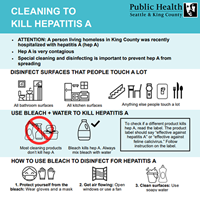Hepatitis A
How does hepatitis A spread?
Hepatitis A virus spreads easily. It gets into the body through the mouth after someone touches an object, food, or drink that is contaminated with the virus.
If an infected person doesn’t wash their hands well, especially after using the toilet, undetectable amounts of the virus can spread from the hands of that person to other objects, surfaces, and foods.
Most cases occur through eating contaminated food.
What increases the risk of getting hepatitis A?
People have more risk of getting hepatitis A if they:
- Experience homelessness, especially if they are unsheltered without good access to sanitation, hygiene and handwashing facilities
- Live with or care for a person who already has hepatitis A
- Have sex with people with hepatitis A
- Are men who have sex with men
- Use street drugs
- Have a clotting disorder like hemophilia
- Are international travelers
- Have chronic liver disease, including hepatitis B and hepatitis C
How can you prevent hepatitis A?
Hepatitis A vaccination is the best way to prevent hepatitis A. The shot is safe and effective. Anyone who wants to reduce their risk of hepatitis A should get vaccinated, and especially anyone who is in the higher risk groups
Hepatitis A vaccinations can also be used to help prevent illness from hepatitis A if you may have been exposed to the virus. It should be given within two weeks of exposure.
Practicing good hand hygiene is also important, including thoroughly washing hands after using the bathroom, changing diapers, and before preparing or eating food. People in high-risk groups should also avoid sharing food, drinks, drug equipment (works), and other personal items.
Where to get a vaccine
- Visit your doctor, nurse, or clinic.
- Check our Healthcare for the Homeless Network page for information about vaccination locations for people living homeless or people who use street drugs.
Flyers
Cleaning to kill hepatitis A (784 KB)
This flyer explains how special cleaning and disinfecting is important to prevent hep A from spreading.
Available in the following languages:
አማርኛ - Amharic (867 KB) | English (784 KB) | Русский - Russian (1.1 MB) | Af Soomaali - Somali (847 KB) | Español - Spanish (683 KB) | ትግርኛ - Tigrinya (798 KB) | Tiếng Việt - Vietnamese (706 KB)
Routine cleaning guidelines (663 KB)
Homeless service provider agencies can also help prevent a major hepatitis A outbreak by making sure staff and clients are following routine cleaning guidelines.
 Translate
Translate
